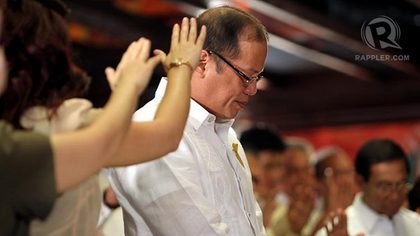SUMMARY
This is AI generated summarization, which may have errors. For context, always refer to the full article.

MANILA, Philippines – Power corrupts, so politicians need extra penance this Lent to avoid the pitfalls of their positions, according to the head of the Manila Archdiocese’s charity arm in time for Ash Wednesday, February 22.
“They need more prayer, fasting, and abstinence to overcome the corruption of power,” said Caritas Manila executive director Fr Anton Pascual in a phone interview with Rappler.
The 3 practices that Pascual enumerated are the pillars of Lent, the 40-day penitential season that commemorates the 40 days when the devil tempted Jesus Christ in the desert.
Lent, which begins with Ash Wednesday, ends after 6 and a half weeks with Easter Sunday, the central feast of Christendom that celebrates the rise of Jesus Christ from the dead.
Especially during this season, praying is important for politicians “so that they will be enlightened by the Holy Spirit, so that they can serve more authentically,” according to Pascual, who is also president of the Church-run Radio Veritas.
Fasting, the priest added, is a means to develop self-control. “That’s very important for us to overcome the temptations of money, of corruption, of abuse of authority.”
“Politicians should learn to give their treasures to the poor,” Pascual also said, referring to the Lenten practice of almsgiving. “Saan nila ginagamit ang pork barrel nila?” (How are they spending their pork barrel?)
Penance for PNoy
Manila Auxiliary Bishop Broderick Pabillo, who heads the Philippine Catholic bishops’ social arm, said the best forms of penance for those in government include the following:
- Ensuring transparency through measures like the Freedom of Information Bill, of which the Palace already has its own version sent to the House of Representatives
- Curbing corruption; and
- Responding to social issues like mining and contractualization of labor
Meanwhile, for President Benigno Aquino III, Pabillo’s advice is for him to tackle societal problems other than Supreme Court Chief Justice Renato Corona’s impeachment.
“Laban lang naman ‘yan ng mga elitist, eh,” said Pabillo, who chairs the Catholic Bishops’ Conference of the Philippines – National Secretariat for Social Action, Justice, and Peace. (That is only an elitist struggle.)
“Sayang ang resources ng pamahalaan,” the bishop explained. “Ito’y isang political exercise na hindi mo alam kung ‘yan ay personal lang o makakatulong talaga sa bansa.” (Government resources are going to waste… This is a political exercise and you don’t know if it’s purely personal or it can really help the country.)
The President has considered acts to stamp out corruption – in Corona’s case, his removal from office – as means to eventually end poverty. Indeed in 2010, he ran on the campaign slogan, “Kung walang corrupt, walang mahirap.” (Without corruption, poverty is gone.)
But for Pabillo, Aquino does not need to look farther than his own family – particularly the Cojuangco clan, which owns Hacienda Luisita. Last year, the Supreme Court decided that the President’s family should distribute it to farmers, for which the Cojuangcos reportedly want P10-B in compensation.
“Tingnan niya muna ang Hacienda Luisita. D’yan siya magpakita (na para siya) sa mahihirap,” Pabillo said. (He should first look at Hacienda Luisita. That is how he can show that he is for the poor.)

Last week, Pabillo celebrated Mass for Hacienda Luisita farmers and delivered a similar message to the President’s family.
“There are three things (through which) we can show our faith. One is by acts of worship… The second thing that we must do is to love our fellowmen. We can show this by doing good works, by loving our neighbor. However, we cannot love our fellowmen (without) a sense of justice. Without the acts of justice, then there is no love,” Pabillo said.
“We must remind (the Cojuangcos) of what they should do,” he added. “Remember that, as it is said in the Holy Scriptures, ‘For what does it profit a man to gain the whole world, and forfeit his soul.’”
Penance for all
Pabillo, however, said the call for penance should extend to all, not only politicians. “Kailangan nating magpenitensya at tulungan ang nangangailangan,” he said. (We need to do penance and help the needy.)
In one of his Ash Wednesday messages, Manila Archbishop Luis Antonio Tagle also called for repentance this Lent. “Huwag nating tigasan ang ating puso. Tayo’y maging bukas sa pagpapakumbaba at pagbabagong-buhay.” (Let us not harden our hearts. Let us be open to humility and repentance.)
Pope Benedict XVI, in his Lenten message, has meanwhile reminded Catholics to “be concerned for each other.”
“All too often, however, our attitude is just the opposite: an indifference and disinterest born of selfishness and masked as a respect for ‘privacy,’” Benedict said.
“What hinders this humane and loving gaze towards our brothers and sisters?” he asked. “Often, it is the possession of material riches and a sense of sufficiency, but it can also be the tendency to put our own interests and problems above all else.”
Even Catholic Church leaders need Lenten penance, in the face of a damaged Church whose problems range from sex abuse scandals to profligate lifestyles. Tagle himself has called for accountability among erring priests. – Rappler.com
Add a comment
How does this make you feel?
There are no comments yet. Add your comment to start the conversation.